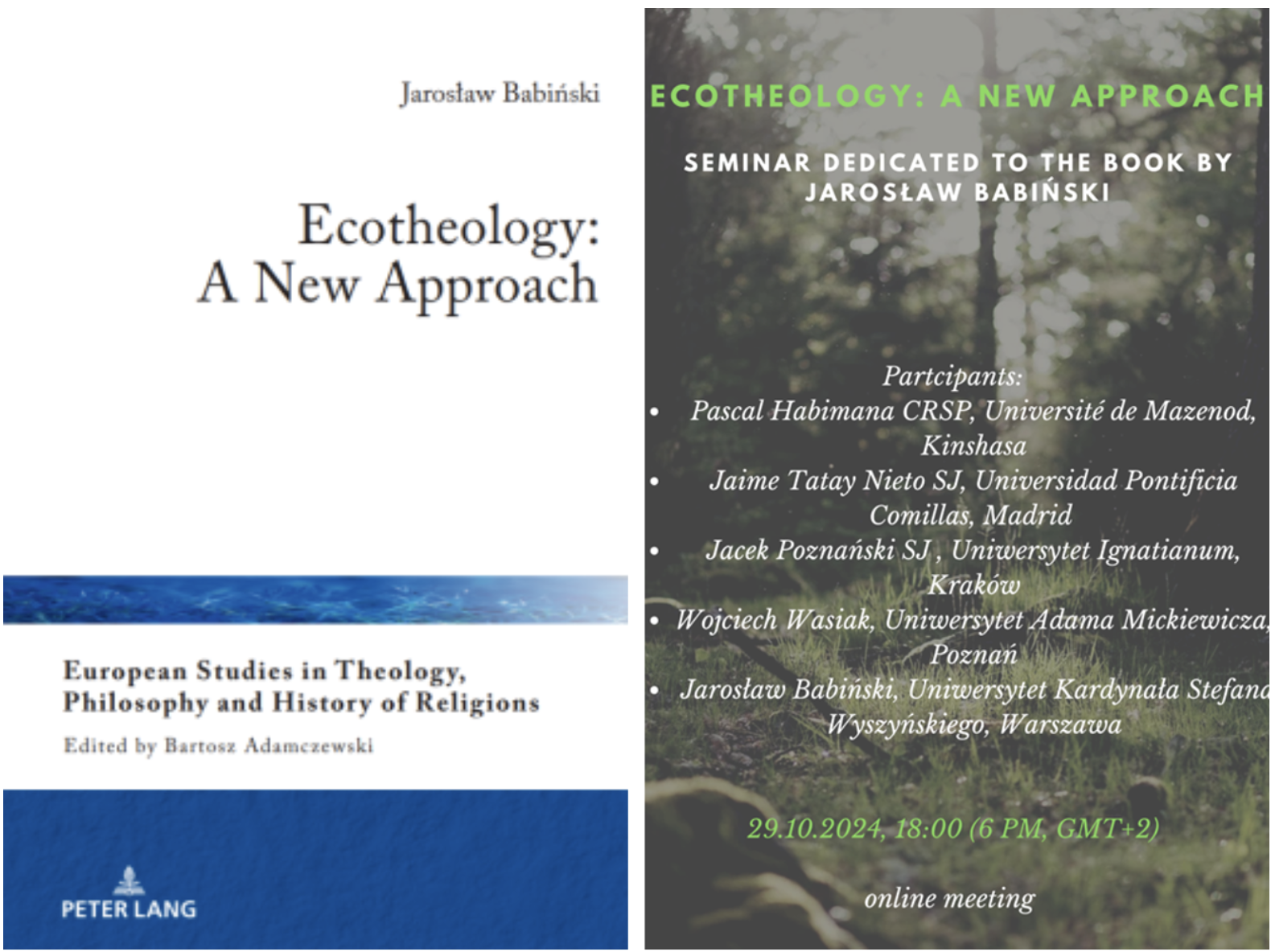ECOTHEOLOGY: A NEW APPROACH. SEMINAR DEDICATED TO THE BOOK BY JAROSŁAW BABIŃSKI
On October 29, 2024, at 6:00 PM, an online seminar dedicated to the book ‘Ecotheology: A New Approach’ took place.
Five speakers were invited to the panel, including the author of the book, Jarosław Babiński. Karolina Kochańczyk-Bonińska, representing the Centre for the Development of Research and Education, moderated the session.
The first speaker was Jacek Poznański, a member of the Faculty of Philosophy at the University Ignatianum Kraków, who presented comments on the overall idea of the book. As he explained, the status and quality of theology have always mattered to culture and civilization as a whole. The concept of the Absolute lies at the core of Western civilization and helps us to understand what it means to be human. Thus, we can argue that the crisis in theology impacts other areas of human society and culture. And without a doubt, we are currently living in a theological crisis. This crisis is intrinsically linked to the crisis of Christianity. However, paradoxically, the ecological crisis presents an opportunity to introduce a new theological approach. The book prepared by Father Jarosław Babiński offers such an opportunity, as it seeks to create theology relevant to contemporary issues.
Father Jacek Poznański highlighted several themes in the monograph:
– The ecological crisis is not merely an economic or technical problem; it should be regarded as an axiological and even eschatological issue.
– Many of the values attributed to nature can only exist in relation to human beings and are closely tied to the question of the existence of God. Thus, we must consider the need to harmonize theological and humanist perspectives. Father Babiński’s book enables a counter-argument against reductionism.
– Human responsibility for our actions, especially in relation to Christological issues and fundamental values. Eschatology should also be considered an important perspective.
– The spiritual motivation for environmental protection. Ecotheology is grounded in both the Bible and the Tradition of the Church. Therefore, we should consider a kind of ecological conversion among Christians. Devoted Christians often need a special kind of communication about ecology—one that is directly rooted in Christian values and Tradition, and includes a spiritual context. Ecotheology can be viewed as a holistic understanding of the Christian message. Father Babiński’s book has the potential to encourage committed Christians to adopt more responsible actions.
– Ecology as an ideology. The development of ecotheology, deeply rooted in the Bible and Tradition, can assist traditionally-minded Christians who are concerned that ecology has become a modern ideology. Father Poznański noted that such concerns are common in traditional circles in Poland.
We should also keep in mind that in Poland, Christianity itself is often ideologized, treated as a set of ideas, opinions, and attitudes. Such Catholicism, however, is detached from the Gospel. Thus, ecotheology can provide the grounds for theology to regain a more authentic context.
Finally, the issue of interdisciplinarity was emphasized in the context of the crisis in theology. Theologians should seek to make theology more relevant and engaging for younger generations. Ecotheology strives for an integrated view of ecological and theological concerns.
The second speaker, Pascal Habimana, a PhD in Dogmatic Theology and Rwandan priest currently working in the Congo, at a local university and seminary, presented the pastoral context and the practical usefulness of the book. As he emphasized, the book offers many solutions to the challenges faced today in Kinshasa, as well as around the world. The ecological crisis is well known, and in Africa, it is especially felt. While mass media reports on it, but concrete solutions are often lacking. As Habimana pointed out, slogans cannot solve these problems. As Christians, we must reflect more deeply on these issues and seek solutions in the Gospel. ‘Ecotheology’ can assist those searching for Christian approaches to the ecological crisis. Habimana also presented the local effects of climate change: every month in Kinshasa, about one hundred people die due to heavy rains, and material losses must also be taken into account.
In Africa, Christianity is a powerful and reliable movement, stronger than many political institutions. Churches are social organizations that still have significant influence and can help raise awareness about climate issues. The first step is to understand Church teaching on ecology, particularly the relationship between humanity and creation.
Habimana suggested translating the book into French, as it could be very useful in university settings.
Wojciech Wasiak from Adam Mickiewicz University in Poznań, a biblical scholar, offered his comments, which focused on the biblical aspects of the book.
He pointed out that a significant portion of the material is based on biblical sources. The book is multilayered, which came as a surprise to him as a reader because it crosses the boundaries of many disciplines: biblical studies, theology, and philosophy. Theology and ecology intersect throughout the work.
Wasiak cautioned that we should be careful in seeking answers to questions not addressed directly in the Bible. While the Bible does not speak directly about ecology, certain themes can be found, starting with Genesis 1-2, which discusses the creation of the world. The concept of creatio ex nihilo in Genesis and in the Maccabean Books is in fact a Greek concept, not a Hebrew one.
There are also instances where the Hebrews were attentive to the quality and condition of their land, which could be considered an early form of ecological thinking. They were also in close contact with nature—perhaps more so than modern biologists who are confined to laboratories. Regulations like the Law of Jubilee, where the soil was allowed to rest, demonstrate an effort to maintain ecological harmony. The Promised Land, described as fertile and productive, is presented as a gift from God. Thus, there is an ecological dimension in the Bible.
Other notable themes in the book include:
– Every human activity should be framed with ecological considerations.
– The distinction between ecology and ecologism—a fruitful distinction that reveals the dangers of ideologization in the context of political engagement.
Wasiak also highlighted that the book discusses ecological issues in Church documents, which is not widely known even among theologians. The book effectively argues for the need for ecological thinking within the Church, though it leaves open the question of how to implement such thinking.
Jaime Tatay from Comillas Pontifical University in Madrid could not attend the seminar due to unforeseen circumstances, but he later sent his comments on the book.
He considered the book to be excellent and made several observations. Although the book is rooted in the Polish context, it is highly relevant to the broader European debate. It addresses a subject of global importance for both the world and the Church: theological reflection on ecological and environmental issues.
The structure of the book is noteworthy, divided into four chapters. The first chapter presents ecology as a natural science and its philosophical and theological context. The second chapter delves into the historical context, including the teachings of the Magisterium, Vatican II, the popes, and the Polish Episcopate. The third chapter focuses on eco-dogmatics, offering perspectives on anthropology, Christology, and eschatology. The final chapter, titled ‘Ecotheological Praxeology’, explores the ethical implications of ecotheology.
Tatay recommended ‘Ecotheology’ as an important book for academic study and teaching.




